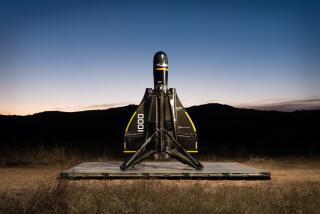Lockheed, McDonnell Finalists in Rocket Contest
- Share via
McDonnell Douglas Corp.’s space group in Huntington Beach and Lockheed Martin Corp. were named finalists Friday to develop a new family of lower-cost rockets for the Pentagon, a competition that should give the eventual winner a huge boost in the commercial market for launch vehicles in the 21st century.
Besides serving the Defense Department, the new rocket program “is a national launch system which will be able to compete and win in the world commercial market,” Air Force Secretary Sheila Widnall said in announcing the finalists at a news conference in Washington.
The two other competitors were Boeing Co. of Seattle and Alliant Techsystems of Minneapolis. Boeing stays in contention because it recently agreed to buy McDonnell Douglas for $13.3 billion in the largest aerospace merger ever.
In addition, Boeing’s Rocketdyne rocket-engine subsidiary in Canoga Park--which Boeing bought earlier this month from Rockwell International Corp.--is developing the main engines for McDonnell’s entry in the competition.
In halving the field of contenders, the Air Force went with the companies that dominate the U.S. rocket industry. Lockheed Martin’s space-launch group in Denver makes the medium-lift Atlas and heavy-lift Titan boosters, and McDonnell builds the smaller Delta rockets.
But the design of those rockets dates to the 1950s, when the launchers were originally developed to carry intercontinental ballistic missiles.
The Pentagon now wants to replace those rockets with a new line of less expensive, more efficient boosters--known as evolved expendable launch vehicles, or EELVs--that would slash its launch costs by up to 50%. The EELV program would use a single, modular system that could be used in different combinations to lift various payloads into low or high orbits.
The ultimate EELV winner is expected to get a $1.4-billion development contract from the Air Force in 1998.
In the meantime, McDonnell’s Huntington Beach operation will add about 250 jobs to the 35 it now has on the EELV project, said the unit’s general manager, Gale Schluter. The operation overall employs about 5,600 people.
“This is a big day for us,” Schluter said. “We think it’s important to our long-term future in the launch-vehicle business.” However, he said that “Lockheed is formidable.”
Indeed, a Lockheed victory in the EELV contest would give the company a hammerlock on the U.S. launch business. Last July, Lockheed won the competition to develop the prototype for the nation’s next-generation reusable space shuttle.
The EELV rockets would begin to launch payloads in 2001 from sites such as Vandenberg Air Force Base. The business prospects for the winner are enormous. The Pentagon has estimated that Uncle Sam alone will need more than 190 launches between 2001 and 2020.
Developing less-costly rockets could give the winner a significant competitive edge in commercial launches as well, where the French-based consortium Arianespace dominates with about 60% of the market. Rockets made in Russia and China also compete in the market.
Peltz reported from Los Angeles and Vartabedian from Washington.
More to Read
Inside the business of entertainment
The Wide Shot brings you news, analysis and insights on everything from streaming wars to production — and what it all means for the future.
You may occasionally receive promotional content from the Los Angeles Times.












